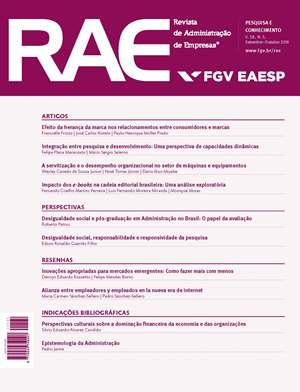Efeito da herança da marca nos relacionamentos entre consumidores e marcas
Conteúdo do artigo principal
Resumo
A herança é uma proposição de valor da marca que fornece uma base única para criar e manter relações fortes com os consumidores. Buscando compreender como esse recurso estratégico influencia as relações entre consumidores e marcas, este estudo objetiva examinar a herança da marca como determinante dos elementos de reforço do self (seduzindo, habilitando e enriquecendo o self). Uma pesquisa com 309 consumidores brasileiros e americanos foi realizada para testar as relações propostas. Baseados em um modelo de equação estrutural, os resultados da pesquisa demonstraram que os consumidores processam as características relacionadas à herança da marca por meio dos três elementos de reforço do self, mas seu efeito global na conexão self-marca só ocorre por meio do prazer sensorial e estético que a marca oferece (seduzindo o self). O estudo é concluído apresentando as implicações acadêmicas e gerenciais e sugerindo pesquisas futuras.
Downloads
Métricas
Detalhes do artigo
A RAE compromete-se a contribuir com a proteção dos direitos intelectuais do autor. Nesse sentido:
- adota a licença Creative Commoms BY (CC-BY) em todos os textos que publica, exceto quando houver indicação de específicos detentores dos direitos autorais e patrimoniais;
- adota software de detecção de similaridades;
- adota ações de combate ao plagio e má conduta ética, alinhada às diretrizes do Committee on Publication Ethics (COPE)
Referências
Aaker, D. A. (2004). Leveraging the corporate brand. California Management Review, 46(3), 6-18. doi:10.2307/41166218
Balmer, J. M. T., Greyser, S. A., & Urde, M. (2006). The crown as a corporate brand: Insights from and monarchies. Journal of Brand Management, 14(1-2), 137-161. doi:10.1057/palgrave.bm.255003
Banerjee, S. (2008). Strategic brand-culture fit: A conceptual framework for brand management. Journal of Brand Management, 15(5), 312- 321. doi:10.1057/palgrave.bm.2550098
Belk, R. W. (1988). Possessions and the extended self. Journal of Consumer Research, 15(2), 139-168. Recuperado de http://www.jstor.org/stable/2489522
Beverland, M. B. (2005). Crafting brand authenticity: The case of luxury wine. Journal of Management Studies, 42(5), 1003-1029. doi:10.1111/j.1467-6486.2005.00530.x
Bruhn, M., Schoenmüller V., Schäfer, D., & Heinrich, D. (2012). Brand authenticity: Towards a deeper understanding of its conceptualization and measurement. Advances in Consumer Research, 40, 567-576. Recuperado de https://ssrn.com/abstract=2402187
Escalas, J. E., & Bettman, J. R. (2003). You are what they eat: The influence of reference groups and consumers’ connections to brands. Journal of Consumer Psychology, 13(3), 339-348. doi:10.1207/S15327663JCP1303_14
Escalas, J. E., & Bettman, J. R. (2005). Self-construal, reference groups, and brand meaning. Journal of Consumer Research, 32, 378-389. doi:10.1086/497549
Fournier, S. (1998). Consumers and their brands: Developing relationship theory in consumer research. Journal of Consumer Research, 24(March), 343-373. doi:10.1086/209515
Grewal, R., Mehta, R., & Kardes, F. R. (2004). The timing of repeat purchases of consumer durable goods: The role of functional bases of consumer attitudes. Journal of Marketing Research, 41, 101-115. doi:10.1509/jmkr.41.1.101.25090
Hakala, U., Lätti, S., & Sandberg, B. (2011). Operationalising brand heritage and cultural heritage. Journal of Product & Brand Management, 20(6), 447-456. doi:10.1108/10610421111166595
Hirschman, E. C., & Holbrook, M. B. (1982). Hedonic consumption: emerging concepts, methods and propositions. Journal of Marketing, 46(Summer), 92-101. doi:10.2307/1251707
Hudson, B. T. (2007). Longevity among leading brands [Working Paper]. Boston, USA: Boston University.
Interbrand (2007). Best Global Brands. [online] Recuperado de https:// www.interbrand.com/best-brands/best-global-brands/2007/ranking/
Kates, S. M. (2004). The dynamics of brand legitimacy: An interpretive study in the gay men's community. Journal of Consumer Research, 31(2), 455-464. doi:10.1086/422122
Merchant, A., & Rose, G. M. (2013). Effects of advertising-evoked vicarious nostalgia on brand heritage. Journal of Business Research, 66(12), 2619-2625. doi:10.1016/j.jbusres.2012.05.021
Napoli, J., Dickinson, S. J., Beverland, M. B., & Farrelly, F. (2014). Measuring consumer-based brand authenticity. Journal of Business Research, 67, 1090-1098. doi:10.1016/j.jbusres.2013.06.001
Oh, H., Prado, P. H. M. P., Korelo, J. C., & Frizzo, F. (2017). The effect of brand authenticity on consumer-brand relationships [Working Paper]. Curitiba, PR: Universidade Federal do Paraná.
Park, C. W., Eisingerich, A. B., & Park, J. W. (2013). Attachment-aversion (AA) model of customer-brand relationships. Journal of Consumer Psychology, 23(2), 229-248. doi:10.1016/j.jcps.2013.01.002
Park, C. W., MacInnis, D. J., & Priester, J. (2006). Beyond attitudes: Attachment and consumer behavior. Seoul Journal of Business, 12(2), 3-35. Recuperado de https://ssrn.com/abstract=961469
Park, C. W., MacInnis, D. J., Priester, J., Eisengerich, A. B., & Iacabucci, A. (2010). Brand attachment and brand attitude strength: Conceptual and empirical differentiation of two critical brand equity drivers. Journal of Marketing, 74(6), 1-17. doi:10.1509/jmkg.74.6.1
Rose, G. M., Merchant, A., Orth, U. R., & Horstmann, F. (2016). Emphasizing brand heritage: Does it work? And how? Journal of Business Research, 69(2), 936-943. doi:10.1016/j.jbusres.2015.06.021
Schmitt, B. (2013). The consumer psychology of customer-brand relationships: Extending the AA relationship model. Journal of Consumer Psychology, 23(2), 249-252. doi:10.1016/j.jcps.2013.01.003
Urde, M., Greyser, S. A., & Balmer, J. M. T. (2007). Corporate brands with a heritage. Journal of Brand Management, 15(1), 4-19. doi:10.1057/ palgrave.bm.2550106
Wiedmann, K. P., Hennigs, N., Schmidt, S., & Wuestefeld, T. (2011). Drivers and outcomes of brand heritage: Consumers’ perception of heritage brands in the automotive industry. Journal of Marketing Theory and Practice, 19(2), 205-220. doi:10.2753/MTP1069-6679190206
Wuestefeld, T., Hennigs, N., Schmidt, S., & Wiedmann, K.-P. (2012, February). The impact of brand heritage on customer perceived value. Der Markt: International Journal of Marketing, 51, 51-61. doi:10.1007/ s12642-012-0074-2







